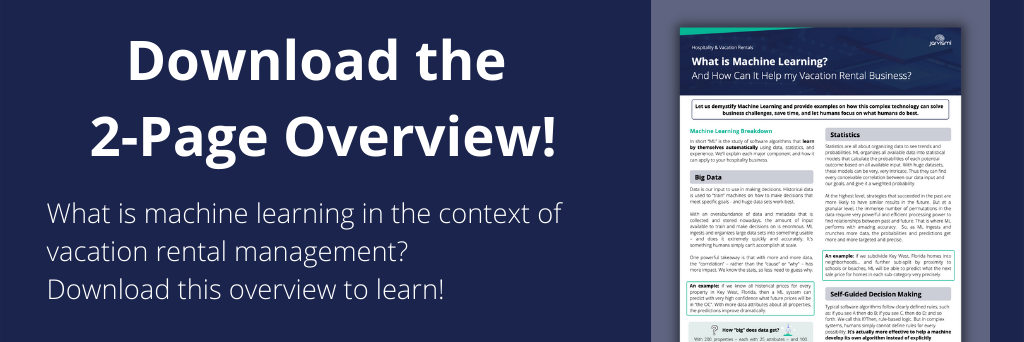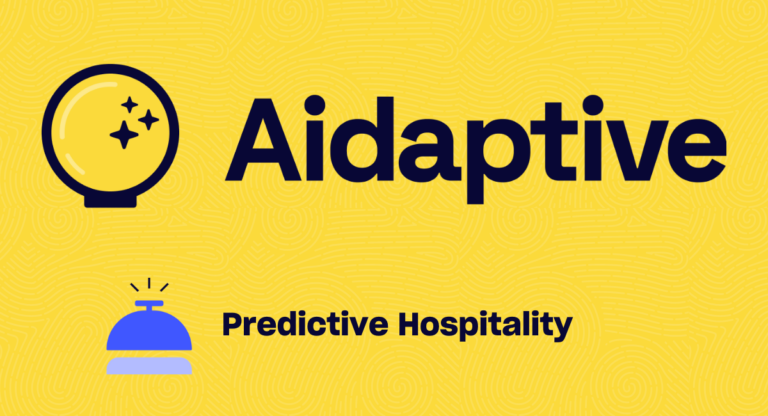Let us demystify Machine Learning and provide examples on how this complex technology can solve business challenges, save time, and let humans focus on what humans do best.
Check out our two page PDF overview, which you can download here.
Machine Learning Breakdown
In short “ML” is the study of software algorithms that learn by themselves automatically using data, statistics, and experience. We’ll explain each major component and how it can apply to your hospitality business.
Big Data
Data is our input to use in making decisions. Historical data is used to “train” machines on how to make decisions that meet specific goals – and huge data sets work best.
With an overabundance of data and metadata that is collected and stored nowadays, the amount of input available to train and make decisions on is enormous. ML ingests and organizes large data sets into something usable – and does it extremely quickly and accurately. It’s something humans simply can’t accomplish at scale.
One powerful takeaway is that with more and more data, the “correlation” – rather than the “cause” or “why” – has more impact. We know the stats, so less need to guess why.
An example: if we know all historical prices for every property in Key West, Florida, then a ML system can predict with very high confidence what future prices will be in “the OC”. With more data attributes about all properties, the predictions improve dramatically.
How “big” does data get?
- With 200 properties – each with 25 attributes – and 100 historical bookings from guests who have data stored in 30 traits – plus layering in web analytics, transactions, expenses, and marketing campaigns, we have multi-millions of rows and permutations to work through.
Statistics
Statistics are all about organizing data to see trends and probabilities. ML organizes all available data into statistical models that calculate the probabilities of each potential outcome based on all available input. With huge datasets, these models can be very, very intricate. Thus they can find every conceivable correlation between our data input and our goals, and give it a weighted probability.
At the highest level, strategies that succeeded in the past are more likely to have similar results in the future. But at a granular level, the immense number of permutations in the data require very powerful and efficient processing power to find relationships between past and future. That is where ML performs with amazing accuracy. So, as ML ingests and crunches more data, the probabilities and predictions get more and more targeted and precise.
An example: if we subdivide Key West, Florida homes into neighborhoods… and further sub-split by proximity to schools or beaches, ML will be able to predict what the next sale price for homes in each sub-category very precisely.
Self-Guided Decision Making
Typical software algorithms follow clearly defined rules, such as: if you see A then do B; if you see C, then do D; and so forth. We call this If/Then, rule-based logic. But in complex systems, humans simply cannot define rules for every possibility. It’s actually more effective to help a machine develop its own algorithm instead of explicitly programming all possibilities.
For that reason, ML is designed to make predictions and decisions by itself, without being explicitly programmed to do so. It uses historical data to train itself and applies statistics to find which paths from A to B work best.
ML also learns by applying its “experience” from real-time calculations. It ingests new data in real-time to “learn”, creating a continuous, ever-improving feedback loop. If it predicts incorrectly, that trains the algorithm. And vis versa.
An example: if the ML predicts a Key West beach house priced 1.5% too low, it will absorb the new data to improve the algorithm immediately for next time.
So how can machine learning help my vacation rental business?
We’ll start with a quote from a Forbes article on dynamic pricing in real estate:
“It likely comes as no surprise that different homes are worth different prices to different people for different reasons at different times. But the challenge for so long has been taking that clear idea and finding [with any real probability] that one person at the right time with the right attribute in a scalable way. That’s where machine learning is breaking new ground.”
Machine learning provides the technical infrastructure and engine to take very specific actions with your data.
Predicting what humans cannot
Three different prospective guests may all have three different property and amenity preferences, different dates/times to book, different prices they will rent at, and different values to your company. Why would you treat them the same?
ML models will use all of your business data across all your systems to predict very specific and accurate recommendations. Each prospective guest – whether there are 3 or 3,000,000 – will get personalized booking experiences. It improves their interactions with your brand, but also improves conversion rates and profit per booking.
Machines don’t need sleep
An ML system is always watching and listening to raise the alarm when there is any meaningful anomaly between what is happening in the moment and what was precisely predicted. If bookings drop or campaigns don’t convert, the machines will notice in real time and send an alert.
So when your email campaign is not on track to generate the expected $50,000 in new bookings for the long weekend, you can catch that moment on Friday afternoon to make adjustments – instead of noticing next Tuesday, with no way to save that lost revenue.
Hidden revenue opportunities
In your business, you may never consider reviewing certain trends or data correlations that seem unimportant or unrelated. For example: the historical relationship between credit card type and duration of stay or neighborhood choice. However, these types of correlations in one-off areas, like this odd example, can inform revenue-driving changes.
ML is able to ingest data that isn’t normally used in analysis to identify areas where optimization changes can lead to huge revenue lift. ML will highlight the trends, predict the highest-impact changes, and calculate the revenue that you’ll earn from that change. Humans simply cannot process as much, as quickly, and as thoroughly.
In Summary
Machine learning software takes in lots of data and builds models to figure out the best way to meet goals. It does this without explicit instructions, learning through experience. ML can be unleashed on any and all of the data from your vacation rental business to identify patterns, calculate paths to highly individualized guest experiences, and discover top-line growth opportunities.
Jarvis ML’s advanced machine learning – built by the team who built Google’s Ad and Fraud Detection “ML” – organizes all of your booking, property, customer, and marketing data to personalize guest experience and drive revenue growth.




